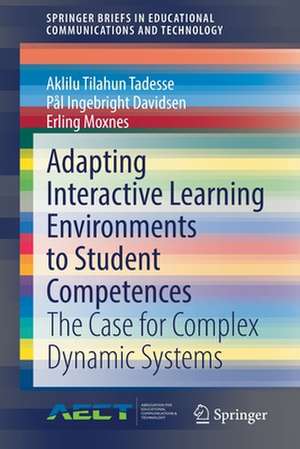Adapting Interactive Learning Environments to Student Competences: The Case for Complex Dynamic Systems: SpringerBriefs in Educational Communications and Technology
Autor Aklilu Tilahun Tadesse, Pål Ingebright Davidsen, Erling Moxnesen Limba Engleză Paperback – 3 noi 2021
The OILE developed for this purpose, builds on a five-step holistic instructional design framework; identification of instructional design models, identification of authentic learning material, identification of instructional methods, identification of instructional techniques, and design of the interface and implementation of the tool. In this OILE development, six well-documented instructional design models were considered; a four component instructional design, first principles of instruction, constructivists learning environment, task centered instruction, cognitive apprenticeship, and elaboration theory.
Din seria SpringerBriefs in Educational Communications and Technology
-
 Preț: 378.54 lei
Preț: 378.54 lei -
 Preț: 375.07 lei
Preț: 375.07 lei -
 Preț: 374.08 lei
Preț: 374.08 lei -
 Preț: 374.08 lei
Preț: 374.08 lei -
 Preț: 375.62 lei
Preț: 375.62 lei -
 Preț: 375.07 lei
Preț: 375.07 lei -
 Preț: 377.18 lei
Preț: 377.18 lei -
 Preț: 444.74 lei
Preț: 444.74 lei -
 Preț: 443.21 lei
Preț: 443.21 lei -
 Preț: 260.38 lei
Preț: 260.38 lei -
 Preț: 376.04 lei
Preț: 376.04 lei -
 Preț: 445.88 lei
Preț: 445.88 lei -
 Preț: 375.07 lei
Preț: 375.07 lei - 15%
 Preț: 461.87 lei
Preț: 461.87 lei
Preț: 442.02 lei
Nou
Puncte Express: 663
Preț estimativ în valută:
84.58€ • 88.55$ • 69.98£
84.58€ • 88.55$ • 69.98£
Carte tipărită la comandă
Livrare economică 07-21 aprilie
Preluare comenzi: 021 569.72.76
Specificații
ISBN-13: 9783030882884
ISBN-10: 3030882888
Pagini: 66
Ilustrații: XI, 66 p. 8 illus. in color.
Dimensiuni: 155 x 235 mm
Greutate: 0.12 kg
Ediția:1st ed. 2021
Editura: Springer International Publishing
Colecția Springer
Seria SpringerBriefs in Educational Communications and Technology
Locul publicării:Cham, Switzerland
ISBN-10: 3030882888
Pagini: 66
Ilustrații: XI, 66 p. 8 illus. in color.
Dimensiuni: 155 x 235 mm
Greutate: 0.12 kg
Ediția:1st ed. 2021
Editura: Springer International Publishing
Colecția Springer
Seria SpringerBriefs in Educational Communications and Technology
Locul publicării:Cham, Switzerland
Cuprins
1. Introduction.- 2. Challenges with supporting learning in and about complex dynamic systems.- 3.Theoretical framework.- 4. Assessing the design framework.- 5. Discussion: Lessons for practice.
Notă biografică
Aklilu Tadesse is a Postdoctoral research fellow at University of Bergen (UiB), Department of Geography, System Dynamics Group. He has an MPhil. and a Ph.D. in System Dynamics from UiB and an MEd. in Physics from Addis Ababa University, Ethiopia. He is a recipient of an honorable mention in the Dana Meadows prize award of the 2019 International System Dynamics Conference. Broadly, Aklilu´s research focuses on instructional designs and their assessment and on model-based study of complex dynamic systems and the dissemination of insights about such systems with students, decision makers, stakeholders, and the public in general.
Pål Davidsen is Professor of System Dynamics (SD) at University of Bergen (UiB),Norway. He has a Mag. Art. in Information Science. Pål has served with Professor Jay W. Forrester (MIT) as Associate Chair of the Pre-College Education Project. At UiB, he founded the System Dynamics Group and the Educational Information Science and Technology Programme and is cofounder of the European Masters Programme in SD. He served as President and as VP of Publications in the System Dynamics Society (SDS) and received the SDS Outstanding Service Award. Davidsen has published e.g. on natural resource management, public health, analysis of complex, dynamic systems, and model-based interactive learning environments.
Erling Moxnes is a Professor in System Dynamics at the University of Bergen, Norway. He has a Masters degree in Control Theory from the Norwegian Institute of Technology and a PhD in System Dynamics from Dartmouth College, USA. Previously he has worked as a researcher at the Christian Michelsen Institute and as Senior Research Economist at the Institute for Research in Economics and Business Administration. He has served as President of the System Dynamics Society, has been on the board of the Millennium Institute in Washington DC, and has received the Jay W. Forrester Award. Moxnes has worked and published in a variety of fields such as system dynamics, economics, management, political science, ecology, economic psychology, drug abuse, climate change, renewable resources management, energy markets, and energy policy.
Pål Davidsen is Professor of System Dynamics (SD) at University of Bergen (UiB),Norway. He has a Mag. Art. in Information Science. Pål has served with Professor Jay W. Forrester (MIT) as Associate Chair of the Pre-College Education Project. At UiB, he founded the System Dynamics Group and the Educational Information Science and Technology Programme and is cofounder of the European Masters Programme in SD. He served as President and as VP of Publications in the System Dynamics Society (SDS) and received the SDS Outstanding Service Award. Davidsen has published e.g. on natural resource management, public health, analysis of complex, dynamic systems, and model-based interactive learning environments.
Erling Moxnes is a Professor in System Dynamics at the University of Bergen, Norway. He has a Masters degree in Control Theory from the Norwegian Institute of Technology and a PhD in System Dynamics from Dartmouth College, USA. Previously he has worked as a researcher at the Christian Michelsen Institute and as Senior Research Economist at the Institute for Research in Economics and Business Administration. He has served as President of the System Dynamics Society, has been on the board of the Millennium Institute in Washington DC, and has received the Jay W. Forrester Award. Moxnes has worked and published in a variety of fields such as system dynamics, economics, management, political science, ecology, economic psychology, drug abuse, climate change, renewable resources management, energy markets, and energy policy.
Textul de pe ultima copertă
Caracteristici
Provides concrete examples of successful online interactive learning environments Presents cutting edge research on curriculum design for learning Discusses methodological and theoretical implications of learning environment design
